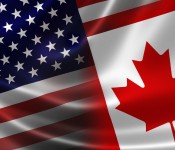What dual citizenship can mean for your taxes

It comes with perks such as job mobility and voting rights, but dual Canadian-American citizenship is double the work when tax time rolls around.
There are approximately one million U.S. citizens living in Canada, according to Statistics Canada. They face extra financial planning considerations — especially during tax season in both countries. The United States imposes taxes on its citizens based on worldwide income, not just income earned in the U.S. With a few exceptions, a Canadian tax bill is generally higher than a U.S. one — which typically means no additional tax is owed south of the border, thanks to a tax treaty between Canada and the U.S.
All that paperwork can be daunting. Laurel Shire moved with her family to Canada from Connecticut about a year ago to teach at the University of Western Ontario. Shire estimates it took her several hours to file both sets of tax returns. For the U.S. return, she had to pore over the tax code to understand the rules, and file a separate form along with her return, reporting her foreign bank accounts. She also had to file the family’s Report of Foreign Bank and Financial Accounts (FBAR), to comply with U.S. money-laundering legislation, at the end of June. FBAR requires U.S. citizens to report any foreign chequing, savings and investment accounts with a total of $10,000 or more.
“We will probably have to file U.S. tax returns for the rest of our lives,” says Shire. “There is a massive amount of regulation.”
The Foreign Account Tax Compliance Act (FATCA) that came into effect on July 1, 2014, has put a spotlight on the issue of U.S. citizens living abroad. Under a new tax information-sharing agreement between Canada and the U.S., financial institutions outside of the U.S. are required to review certain types of accounts and identify those held by U.S citizens. These require information to be reported to the Canada Revenue Agency to be shared with the Internal Revenue Service (IRS).
“Some Canadians might not realize they are U.S. citizens, especially if they’ve lived in Canada their whole lives,” says Cindy Crean, Managing Director, Private Client at Sun Life Global Investments. “Even if people are aware they’re U.S. citizens, they might not realize they have filing requirements.”
If you are (or suspect you may be) a dual citizen, here are some useful steps to take:
- Double-check your citizenship. If your parents were U.S. citizens or if you were born in the U.S., it’s a good idea to confirm the status of your citizenship.
- Look into amnesty programs. A recently announced Internal Revenue Service amnesty program aims to make it easier for U.S. taxpayers to catch up on their filings without facing steep penalties.
- Seek professional advice. If you’re not sure about how your citizenship status might affect your tax obligations, consider getting a professional opinion. Every situation is unique and tax laws change frequently.
Original Source: What dual citizenship can mean for your taxes, By Krista Seggewiss,BrighterLife.ca
©iStockphoto.com/ ronniechua


Comments are closed.